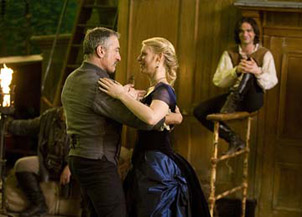|
|
A-List: British Directors Who Make It Big in AmericaBy Josh SpiegelAugust 12, 2010
Sam Mendes Debuts don’t get much bigger than they did for Sam Mendes. Though I wouldn’t equate the quality of the film with that of Citizen Kane, another big debut film for its director, Orson Welles, the 1999 Best Picture winner, American Beauty, did a lot for Mendes’ career. Mendes won the Best Director Oscar, and became the hottest name in directing. Though he had an extensive background in theatre, his visual flourishes, the sharp and witty script, and excellent acting, made American Beauty a zeitgeist film, and Mendes close to a household name. His follow-up film, 2002’s Road to Perdition, is his best and, of course, most underrated. In some ways, Mendes hasn’t ever lived down American Beauty; the film doesn’t get the same love it did 11 years ago, and Mendes is best known now for divorcing Kate Winslet (also known as the stupidest thing a person can do). Still, Sam Mendes’ name does denote an assumption of quality. His filmography is a bit spotty, going from American Beauty to Road to Perdition to Jarhead to Revolutionary Road to Away We Go, but I’ve still got plenty of hope for the man. As of right now, he’s still attached in some form to the next James Bond movie; with the financial woes MGM has been going through, who knows if he’ll still helm the film once the dust clears? If anything, I’d like Mendes to do something a little less Hollywood; it’s rare for a James Bond movie to be helmed by such a distinct auteur. Even Martin Campbell, who helmed GoldenEye and Casino Royale, doesn’t have such a unique vision in his work. Mendes’ presence might hamper the film; then again, he might prove us all wrong. Whatever the case, Mendes is still a force to be reckoned with in American film, despite always seeming a bit too much like a one-hit wonder.
|

|
|
|

|
Friday, November 1, 2024
© 2024 Box Office Prophets, a division of One Of Us, Inc.


